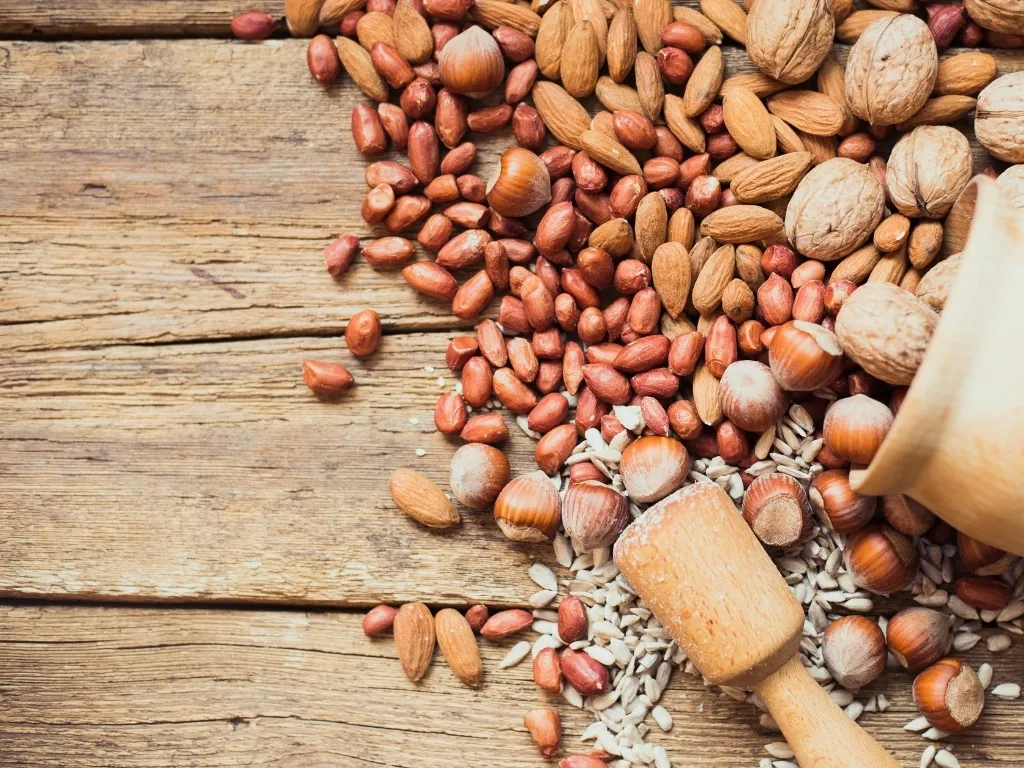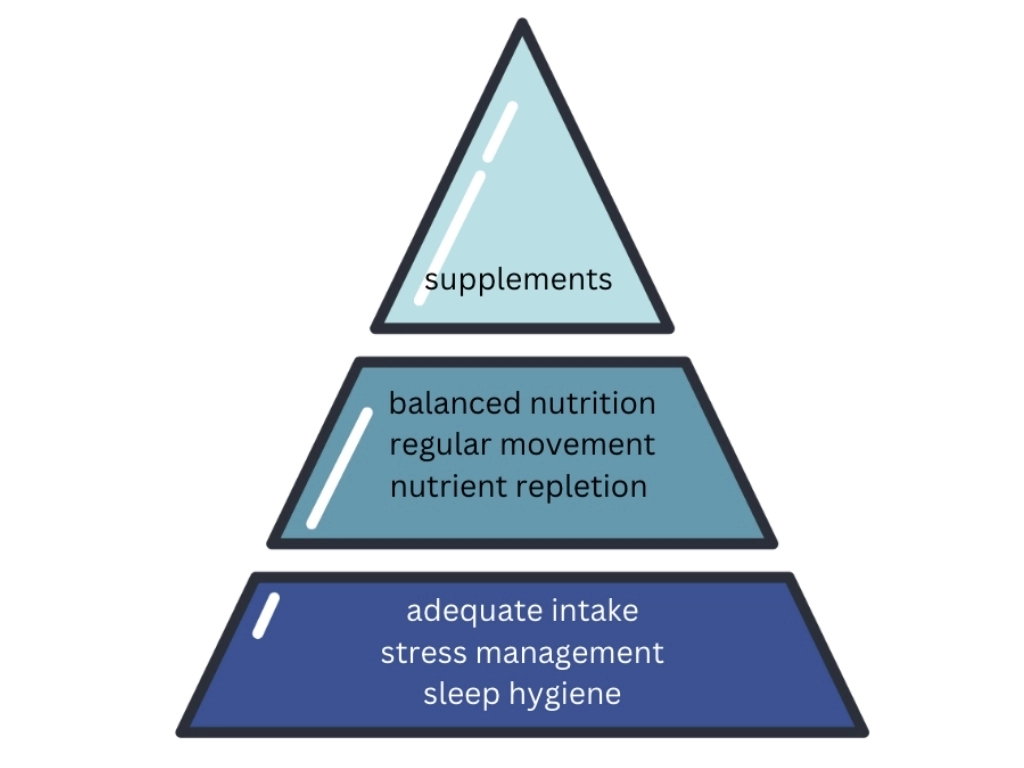Polycystic Ovary Syndrome (PCOS) is the most common hormone condition in women of childbearing age. It is caused by a mix of ovulation problems (like irregular or missed periods) and higher levels of androgens, often called “male hormones.”
PCOS is a diagnosis of exclusion, including 2 of the 3 symptoms
- Infrequent or missed menstrual cycles, acne
- Clinical or biochemical signs of high androgens
- The appearance of polycystic ovaries on ultrasound

These hormonal imbalances can lead to a range of symptoms, including acne, excess facial or body hair (hirsutism), thinning hair along the scalp, weight gain, insulin resistance, and difficulty getting pregnant.
A PCOS diagnosis can feel overwhelming, especially with so much fearmongering and conflicting advice about supplements and crash diets available online.
In this blog post, we will cover two common supplements for managing PCOS, however, working with a dietitian through Health Loft is the best option for personalized nutrition and supplement advice tailored to your unique needs, lifestyle, and goals.
The two supplements in question are Berberine and Myo-Inositol.
What is berberine?
- Berberine is a natural plant compound (an alkaloid) found in several herbs from the Berberidaceae family, including goldenseal, barberry, Oregon grape, and tree turmeric. This bright yellow compound has a long history of use in traditional Chinese and Ayurvedic medicine.

What is inositol?
- Inositol is a naturally occurring sugar alcohol (sometimes called “vitamin B-like”) that plays a role in cell signaling and insulin pathways. While inositol can be found in nuts, fruits, and grains, it can also be made directly by the body.
- Some clinical studies use a 40:1 ratio of myo-inositol (myo) to D-chiro-inositol (DCI) because this ratio reflects the natural combination of these two inositols found in the human body. This appears to be more effective in improving metabolic and reproductive outcomes in PCOS than other inositol forms.

How do berberine and inositol help manage PCOS symptoms?
Insulin resistance
As mentioned earlier, insulin resistance is one of the main driving forces of PCOS. In several clinical studies, both supplements have demonstrated comparable effects to metformin in improving metabolic markers and insulin sensitivity. Both berberine and myo-inositol significantly improved fasting glucose, fasting insulin, glucose/insulin ratio, and hormonal markers vs baseline.
But what is insulin resistance?
Insulin resistance occurs when your body’s cells do not respond to insulin effectively, which is needed to move sugar (or glucose) from your blood into the cells to make energy. One analogy is thinking of insulin like a cashier at the checkout line in the grocery store. When everything is running smoothly, glucose can quickly move through the line and enter the cell to make energy. But with insulin resistance, the check out lines are all jammed up. The cashiers keep trying to recruit more help (your body releasing more and more insulin), but the lines barely move. Over time, this traffic jam leads to high blood sugar levels. As you can imagine, this is a stressor on the body and can also increase sugar cravings.
Berberine has been shown to improve insulin sensitivity by activating an enzyme called AMPK. This enzyme helps cells use glucose more efficiently. Think of AMPK like the store manager who notices the chaos in the grocery store and opens up more check out lanes to boost efficiency.
Inositol, particularly myo-inositol, works as a cellular messenger that helps insulin signal properly. Think of these secondary messengers as updates to the barcode scanner and payment system that helps the cashier do their job more effectively. Many studies show that inositol supplementation improves fasting insulin and blood sugar levels, supporting long-term metabolic health in women with PCOS.
What are some of the differences between berberine and myo-inositol?
Berberine for metabolic health:
In 2022, a prospective randomized control trial compared myo-inositol, berberine, and metformin in women with PCOS, and the results showed:
- All groups improved cholesterol and triglycerides, but berberine showed the greatest benefit, leading to larger decreases in total cholesterol, LDL, and triglycerides, and the biggest increase in HDL compared to metformin and myo-inositol.
- All treatments reduced weight and BMI, but berberine led to the largest drop in waist size and waist-to-hip ratio, showing a stronger effect on central fat loss than metformin or myo-inositol.
- These findings suggest berberine may be a great option for women with PCOS that are focused on cardiovascular health and weight loss.
Myo-inositol for fertility:
Improving cycle regularity:
- In a large observational study, women using myo-inositol + folic acid for ~10 weeks showed 70% restoration of ovulation, with significant reductions in testosterone (96.6 → 43.3 ng/mL) and increases in progesterone (2.1 → 12.3 ng/mL).
- Another study of a total of 90 women diagnosed with PCOS, around 68% of patients restored menstrual cycle regularity with supplementation of MI.
Impact on gestational diabetes:
Supplementing MI has been linked to reduced incidence of gestational diabetes mellitus (GDM) and linked to reduced fasting glucose, oral glucose tolerance test (OGTT), birth weight, and other related complications.
- One study found that the prevalence of GDM in the MI group was 17.4% versus 54% in the control group.
- More research is needed to confirm MI’s impact on GDM, as other studies have found no impact of MI on GDM outcomes.
It is important to note that there is also research that supports berberine for fertility. One study of 150 infertile women found that taking berberine 3 months prior to IVF led to higher pregnancy rates than metformin or the placebo group. However, it is important to note that the use of berberine in pregnancy is contraindicated.
What are the main takeaways?
| Myo-Inositol | Berberine | |
|---|---|---|
| What is it? | Inositol is a naturally occurring sugar alcohol (sometimes called “vitamin B-like”) that can be found in nuts, fruits, grains, or made directly by the body | Berberine is a natural plant compound (an alkaloid) found in several herbs |
| Effects on insulin resistance | Secondary messenger that helps cells respond better to insulin | Improves the uptake of glucose into the cells through AMPK enzyme activity |
| Metabolic effects | Mild improvements on the lipid panel | Significant improvements in triglycerides and cholesterol levels |
| Reproductive effects | Restores ovulation, improves menstrual regularity, and may enhance fertility outcomes | May regulate menstrual cycles and reduce androgen (testosterone) levels |
| Impact on weight | Modest impact | Moderate weight loss and reduced waist circumference |
| Best for | Women focused on fertility, gestational diabetes prevention, hormone balance, or early insulin resistance | Women with PCOS and signs of metabolic syndrome (high blood sugar, cholesterol, or abdominal fat) |
| Typical dosage | 2-4g per day 40:1 myo: DCI ratio | 500 mg, 2-3x a day with meals |
| Common side effects | Generally well-tolerated. Some studies reported headaches as a side effect. | Possible mild GI symptoms (loose stool, stomach cramping) |
| Can they be taken together? |
Yes, it is generally considered safe to take berberine and inositol together. It is important to note that there may be a risk of low blood sugar, particularly if you are already taking metformin, a GLP-1, insulin, or other medications for PCOS. A healthcare provider who is well-versed with supplements can help determine whether using one or both is appropriate based on your individual symptoms, medical history, and medication use. |
|

Supplements can help, but nutrition is still key
Both berberine and inositol have been shown to be supportive for women with PCOS through improving insulin sensitivity to aiding hormone balance, to improving cycle regularity, but they should not be treated as standalone solutions.
Similar to Maslow’s Hierarchy of Needs, a solid base of adequate nutrition, sleep hygiene, stress management, and movement is essential for supplements to be an effective complementary tool to lifestyle changes.

For individualized guidance, working with a registered dietitian can help you sort through the information overload to help you find relevant answers for your specific body and lifestyle. You will be able to ensure your nutrient needs are met, navigate supplement choices together, and co-create a sustainable plan that supports your long-term goals.
Your PCOS health journey does not need to be confusing or overwhelming. Connect with a Health Loft dietitian for tailored support today.
This article was written by Solveig Adalsteinsdottir, MS RDN. It is meant to provide general guidance but should not replace personalized medical or nutrition advice.













